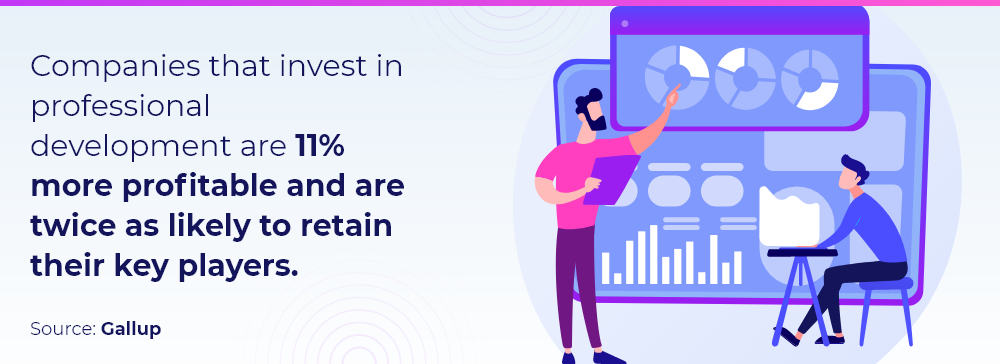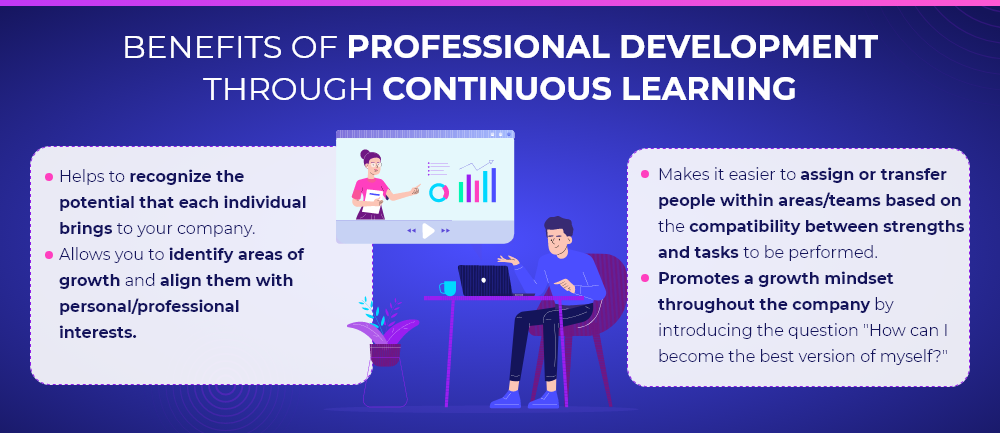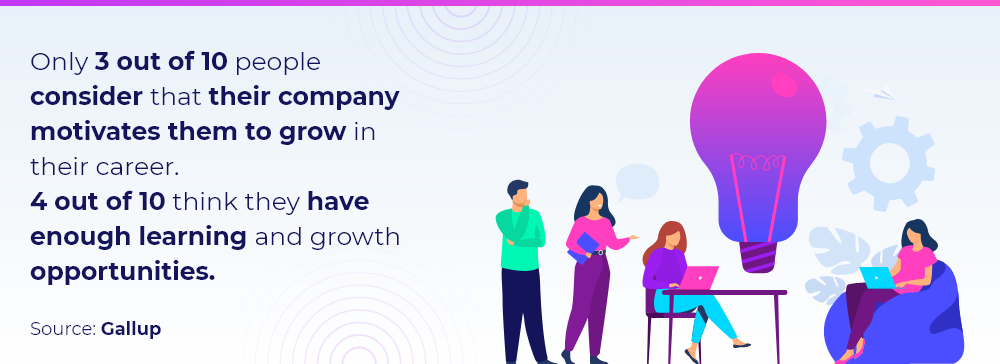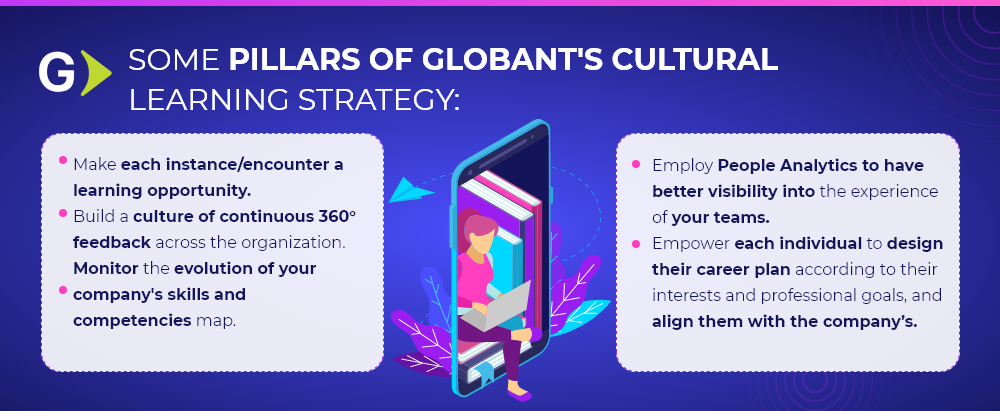Employee development through ongoing learning: a different approach that will lead you to success
Written by María Eugenia Raffaele
Those in leadership roles know how challenging it is to find the right people for their company. Well, keeping them engaged and passionate about it can be even more so. By building an organizational culture that promotes employee development through continuous learning, you’ll be creating a space that everyone wants to be part of and, consequently, will make your company more successful and adaptable to changes.
Employee development through ongoing learning brings about many benefits: from attracting the best talents – who could resist a culture that encourages professional growth? – to improving your teams’ level of satisfaction – which translates into an increase in the productivity and performance of your organization. According to Gallup, organizations that invest in their people’s professional development prove to be 11% more profitable than their competitors and are twice as likely to retain their best talents.

In this article we want to tell you how replacing traditional career path plans by a modern culture of continuous learning can lead you to build a much more profitable organization that helps your teams turn into the professionals of tomorrow.
Professional development and ongoing learning go hand in hand
Staff development is a process that allows us to understand each individual’s strengths and skills. This process helps us match each profile to the tasks, positions, projects, and teams that suit them best, bringing out the best from each employee. How is this connected to continuous learning? Here’s the answer: Ongoing learning consists in offering all employees opportunities so that they can enhance their skills and abilities, and identify areas of improvement to grow both personally and professionally. Therefore, it is essential that organizations make employee training and development a priority in their company’s culture. “An ongoing learning culture is based on the premise that we all have room to grow and incorporate new knowledge. I think this means that it is possible to explicitly recognize that we are not perfect, and that we are not obliged to know the solution to all problems. And therefore we can “not know” and that is just fine, as long as we are willing to recognize it, seek the necessary resources to improve, and demonstrate the ability to do reskilling or upskilling when the time is right. In itself, we’re talking about a culture that promotes values such as transparency, honesty and connection between the leader and the led ”, points out Pablo Bumaschny, director of People Experience at Globant.

Promoting a mindset of continuous learning, leaving old-fashioned employee development plans behind, is critical for organizations since knowledge, skills and abilities are factors that determine how competitive and productive a company can be. Additionally, this mindset can help you to overcome challenges more effectively than companies with a fixed-mindset approach.
Three current challenges you can solve by promoting a culture of continuous learning
Challenge # 1: Digital Transformation
Digital transformation is changing companies’ paradigms and business models. Added to this is the experience of 2020, which showed us how urgent it is to adapt to the transformations of our context: “to a situation that was already challenging for organizations, the pandemic added the breakdown of many roles, functions and modified needs. That is why the change towards a mindset that promotes ongoing training, the ability to learn from everyone and everything, is crucial for companies seeking to adapt to this new normal”, says Adriana Sclar, Studio Partner of Cultural Hacking at Globant. The future of business demands agile cultures, willing to innovate and provide employees with learning opportunities that allow them to become owners of their personal development.
Challenge # 2: Retention of personnel
When it comes to this issue, many leaders often overlook that learning and staff development opportunities are key factors that can help them retain their best talents. Actually, many people feel that they are not receiving the employee training opportunities they need for their professional growth:

Ongoing learning motivates individuals, so you should offer people ideas to improve and do their work better. Show your employees a genuine interest in their development by bringing out their full potential through challenging goals. This way, you’ll promote more dynamism in your company and keep people’s motivation going.
Challenge # 3: Train the talents of the future
How can leaders prepare their organization for such an uncertain future? One thing we know for sure: Successful talent management is only possible if we work on our versatility, adaptation and innovation. Being open to learn every day will result in a more agile and flexible company. In turn, you’ll be giving people a sense of direction without being afraid to make adjustments when necessary. “A culture of continuous learning is a “be prepared” culture. That is, when facing challenging new situations, employees who have developed the capacity to rethink their role and paths will be able to lead the company’s success. Without an already established culture of ongoing learning, drastic changes can make employees paralyze. However, being used to facing new challenges develops an “agile” attitude towards our career paths – if our role becomes obsolete we can easily find ways to make an impact on areas of the organization that have become more relevant in the new scenario”, explains Pablo Bumaschny. Companies that best adapt to what is coming will be those that enable experimentation, take risks, and base their decisions on data that they obtain from their own reality. As Jeff Dyer, Hal Gregersen and Clayton Christensen point out in their work called The DNA of Innovators, the world’s most innovative companies act like anthropologists: they ask questions, constantly experiment and learn continuously.
Where you should focus to promote lifelong learning: Globant’s example
Globant is a native digital company with more than 16,250 employees in 16 countries that, since its beginning, understood that the digital and cognitive revolutions are changing the way organizations connect with users and employees. They cling to the belief that agility and innovation allow companies to create values more effectively and efficiently. This is why they help companies to build a strong culture where constant learning allows them to get deeper insight into employees’ performance, needs and expectations, in order to use that information as a vehicle to promote people’s growth and organizational success.

“At Globant and the companies we work with, we emphasize the idea that it’s not about leaders writing long-term career plans for their teams, but about co-creating paths of continuous growth that generate commitment and empowerment. If, as a leader, I guide you to make and shape your own plan, to remain open and flexible to changes, to acknowledge your strengths, understand where you’re standing and what your goals are, I’ll be giving you a valuable tool for life that will make a difference in your future career”, says Adriana Sclar. To implement this strategy successfully, Globant developed StarMeUp, a cultural platform that allows companies to ensure that everyone is in tune with a growth mindset, while keeping their teams motivated, connected and productive.
Ready to adopt a new mindset?
If anything has become clear after 2020, is that we live in a volatile and unpredictable world that can lead us to change direction overnight. In this respect, the way we approach training within the organization can make a difference in our overall results. Remember ongoing learning not only enhances personal growth, it is a crucial element for professional and business success. If you need help to transform your organizational culture, or are looking for ways to enhance learning in your organization through technology, at StarMeUp we are eager to help you make your company even more successful. Contact us!